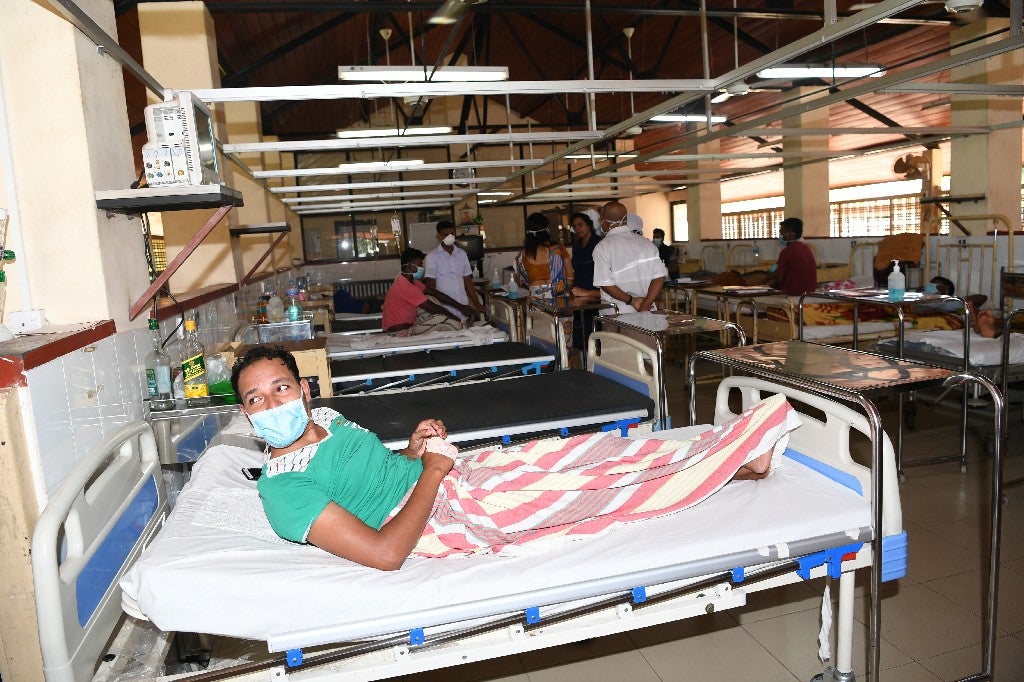An Aggressive Delta Variant and a Crumbling Economy: What is the Way Out for Sri Lanka?
Chulanee Attanayake
20 September 2021Summary
Sri Lanka’s COVID-19 challenge continues as one wave after another impacts the country, the latest being the aggressive Delta variant. The government is facing the challenge of maintaining economic progress and political stability. Amidst growing criticism by health sector professionals against the government for disregarding their suggestions and recommendations, the public has started questioning President Gotabaya Rajapaksa’s capability and efficiency in providing promised healthcare and security. This paper explores the implications of the existential threat of the pandemic for the island nation.
Third Wave of the Pandemic
On 21 August 2021, Sri Lanka announced a 10-day nationwide lockdown, which was later extended till 21 September 2021. The decision came following 187 deaths and 3,793 cases on 18 August 2021due to COVID-19. The Delta variant, which caused this surge in infections and deaths, has overwhelmed the island’s health system.
Just a year ago, Sri Lanka was acknowledged for successfully managing the COVID-19 pandemic. In August 2020, the World Health Organization featured the country in its August Feature Countries report and commended its robust health system, a cohesive collaboration of different sectors and stakeholders, accessible and proactive communication, scaled up a system of surveillance and rapid case investigations – all of which contributed to the country’s success in containing the virus. Fast forward a year, Sri Lanka is grappling with a more aggressive third wave of the pandemic.
The third wave, which began in April 2021, was caused by celebrations and shopping sprees during the New Year festival. The public took advantage of the eased restrictions, engaged in large gatherings and cross-border travels resulting in a deadly spike of COVID-19 cases. The Alpha variant (the United Kingdom variant) caused most of the cases at the time. However, in late June 2021, patients in Colombo were diagnosed with the Delta variant. A recent report by the Department of Immunology and Molecular Biology at Sri Jayewardenepura University revealed 70-90 per cent of the new cases found in Colombo belonged to the Delta variant. With its high transmissibility rate, the death toll has increased by 48 per cent and daily infection rates have crossed 4,000 stretching the healthcare service beyond its capacity, with hospitals and health workers struggling to cope with the situation.
Causing much public concern, three mutations of the rapidly contagious Delta variant were identified through gene sequencing done by health experts, out of which one was only identified in Sri Lanka. Further, researchers are concerned with the possibility of the three mutations evolving into an entirely new strain.
Rising Pressure on the Government
As the pandemic situation worsens in the country, the Gotabaya Rajapaksa government is in a dilemma. On the one hand, it faces rising criticism for failing to manage the pandemic while on the other, it is dealing with a crumbling economy.
According to health experts, the present pandemic situation in the country is a result of too much political interference in scientific decision-making. These criticisms are well-founded to a certain extent as the government eased restrictions in April 2021 despite warnings of a surge and rejected multiple times the mounting calls for an immediate island-wide lockdown. It also did not pay enough attention to increase the polymerase chain reaction testing. Delays and mismanagement in the vaccine rollout and failure to provide adequate safety measures for the health sector have overburdened the system. In early July 2021, several health worker unions resorted to trade union actions demanding better pay and assurance of better safety systems.
However, for Gotabaya’s government, balancing between health experts’ recommendations and preventing greater damage to the economy are both a dilemma and a challenge. Sri Lanka’s economy was already crumbling before the pandemic due to low growth averaging under three per cent, high public debt nearing 90 per cent of gross domestic product (GDP) and large fiscal deficits of nearly seven per cent of the GDP as of end-2019. With a decline in forex earnings due to a massive drop in earnings from tourism and foreign remittances, as well as downgrades by credit agencies, the country is in a severe food emergency.
Is the Vaccine the Way Out?
Every evidence points to the fact that the Coronavirus is here to stay for an unforeseeable time. As any other country in the world, Sri Lanka too knows that vaccination is key. According to publicly available data, the country has fully vaccinated approximately 49 per cent of its population as on 15 September 2021. Its cases, which were at a 95 per cent peak, are dropping rapidly. While this provides hope for industries such as tourism as it will boost the confidence of tourists and investors to come to Sri Lanka, the government has the challenging task of maintaining the pandemic at a manageable level. As it is evidenced from countries like Singapore, vaccinating the population does not eradicate the virus, nor does it stop the spread. It only reduces the severity. Thus, the government has to lay out a plan that ensures the smooth operation of business without risking the health of the people or having to go for a lockdown. Only then will Gotabaya’s government be able to come out of this crisis and deliver on his ambitious promises.
. . . . .
Dr Chulanee Attanayake is a Visiting Research Fellow at the Institute of South Asian Studies (ISAS), National University of Singapore (NUS). She can be contacted at chulanee@nus.edu.sg. The author bears full responsibility for the facts cited and opinions expressed in this paper.
-
 More From :
More From :
-
 Tags :
Tags :
-
 Download PDF
Download PDF



